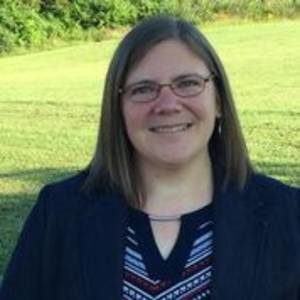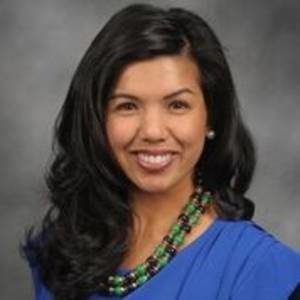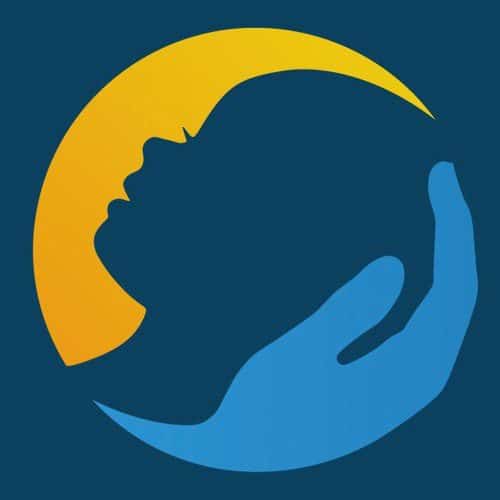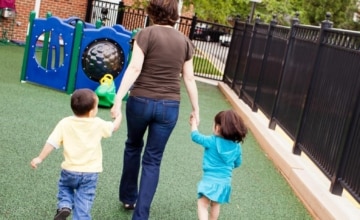by Erin Lucas and Aimee Hilado
Editor’s Note: ZERO TO THREE has a branch of our family tree that you may not know much about unless you are a part of it—the ZERO TO THREE Fellows. For more than three decades, the ZERO TO THREE Fellowship has been the premier leadership experience for professionals who work to be champions in the lives of infants, toddlers, and their families. To highlight the important work that the Class of 2018–2020 is doing, Crib Notes has asked two of the Fellows to briefly share the focus of their work, why it is important to them, and how the Fellowship experience has made a difference. And if you enjoy reading their stories, then you’ll be delighted to dig into the May issue of the ZERO TO THREE Journal, which will feature more of the Fellows’ work that is changing the worlds of infants, toddlers, and their families and the professionals and policymakers who work on their behalf.
Erin Lucas, Director of Early Childhood Programs, Hopewell Health Centers

Erin Lucas, Director, Early Childhood Programs, Hopewell Health Centers
Ten years into my career as a social worker, sitting with a peer at a café, I vividly recall sharing my dream job. Though I had grown weary of direct service, my heart was still filled with passion for serving the underserved in my home region of southeast Ohio. “If I could train and supervise, I feel like I could have a larger impact. I want to help others have what they need to help children.” Little did I know, that seemingly innocent conversation, would lead to my transition into the early childhood field.
When I applied for the ZERO TO THREE Fellowship experience, I was 5 years into my leadership as director of Early Childhood Programs at Hopewell Health Centers (HHC), Inc. We had grown from this team of 8 to a team of 30 that supported programs across nine sites and 18 counties. We had achieved our dream of housing an early childhood professional in each of our HHC sites and had even created a home-base, moving from three offices to our own building. Our rapid expansion and partnership with state-level initiatives led us into unchartered territory. I found my leadership skills stretched to their limit and my capacity for supporting this expansion strained. Yet, we were still committed to the dream of comprehensive integrated services for children birth to school age throughout our region.
Ensuring access to affordable, high-quality, integrated health care for children birth to school age was the identified vision for our work. We developed a model to guide the work and adopted a structure, identifying coordinators of programs to implement the model. I hoped to use the ZERO TO THREE Fellowship experience to learn how to balance the gifts of leaders on our team with structure, clear guidance, and direction to ensure a unified approach to our work. I wanted to be a leader that celebrates the gifts of team members but balances that with making sure the larger vision isn’t lost and community needs are met. I looked forward to learning more about how to negotiate state politics to advocate for policy that would guide our systems into solid programming, as well as how to help state-level leaders understand the needs of local systems.
It was only natural that our team would begin integration efforts by piloting the addition of early childhood mental health (ECMH) consultants to Early Intervention due to our service coordination contract in Athens County. The success of this partnership led to the development of a protocol to replicate the process in other interested counties. Through this ECMH consultation process, we learned of additional needs of our rural Early Intervention teams. Many had little to no access to occupational therapy (OT), physical therapy (PT), and speech therapy (ST) in the natural environment for children with disabilities. According to Ohio Department of Developmental Disabilities, 1.3% of children in Ohio from birth to 1 year old and 2.8% of children from birth to 3 years old are estimated to qualify for Early Intervention services. According to data from the state 2017 fiscal year, only 0.68% of children birth to 1 and 1.73% of children birth to 3 in counties served by Hopewell Health Centers received Early Intervention services. Ohio Department of Developmental Disabilities had provided temporary funding to help the region’s Early Interventions teams develop full teams of OT, PT, and ST to share in small counties. Though this project taught teams to use a multi-disciplinary perspective, there were no funding solutions to maintain access to allied professionals after the end of the project.
As an integrated care organization, leaders from Early Childhood Programs at Hopewell Health Centers felt it aligned with the vision for comprehensive integrated care to determine a sustainable mechanism to maintain access in the region to OT, PT, and ST. Learning more about the intricacies of being a Federally Qualified Health Center, we worked with executive leaders to add these services to our practice, develop billing mechanisms and documentation systems, and finally, pilot using a system of payment for services provided by therapists hired by Hopewell with temporary grant funds. The process tested the perseverance, patience, and persistence of leaders, therapists, and supervisors alike. However, at the end of December 2019, we completed our first 6 months of implementation, serving 185 children and providing almost 1,000 encounters within Early Intervention. In addition, 11 teams maintained access to OT, PT, and ST and added a mental health perspective through ECMH consultation. These services were funded through a system of payment blending funding from billing fee-for-service through Ohio Medicaid, insurance, and Payer of Last Resort, with funding from local county boards to cover non-billable expenses.
This project is just one example of the impact of the Fellowship on early childhood services in Appalachian Ohio. Overall, incorporating the concepts of adaptive leadership led to state-level recognition for work across the Early Childhood team: • the training coordinator was named Ohio Early Childhood Mental Health Master Trainer of the Year • a model the team developed and piloted for ECMH consultation in Early Intervention was funded for implementation across the state and received a Community Collaboration Award with recognition from the Ohio Attorney General • infant mental health was established and secured funding for implementation of HealthySteps in 2020, and • the expansion of the consultation model to school age received state recognition for their successful implementation of Handle With Care, a program to meet the needs of children exposed to trauma, and was asked to help support expansion of the model statewide.
One of these successes would have been evidence of a single leader’s use of concepts of adaptive leadership. The combination of all of these successes experienced by one team over the course of a year indicates impact of a system committing to the concepts of adaptive leadership and together growing their skill in implementation.
While these outcomes speak to the impact of the Fellowship on a system of care in Appalachia Ohio, to confine the experience to a series of outcomes loses sight of the personal impact on me, the Fellow. When I think back to the “me” sitting in that café, sharing my concept of a dream job, I see the heart of a warrior ready to step into battle. Only 5 years in, I was weary and needed to find other leaders fighting the battle toward equity for babies. This Fellowship confirmed that stepping into the unknown, speaking the unspeakable, engaging the “avoided” are all necessary to change the landscape for young children and build a comprehensive, integrated care system. Yet, without support, someone to stand with you in the midst of conflict, speak words of encouragement to you as plans fall apart, remind you of who you are and why you came to this undisturbed place with plans of uprooting the “way it’s always been done”…without this kind of support, many leaders fall—fall back into their comfort zone, the safety of the known, maintaining the silence of inequity. For years, I have known my calling is to “speak up for people who cannot speak for themselves, to protect the rights of all who are helpless,” (Proverbs 31:8). This Fellowship has helped me learn to listen and find my voice and led me to a community of support to join in this calling. I step forward from this experience a stronger mom, wife, daughter, and director, equipped to march on in the journey towards equity.
Aimee Hilado, Assistant Professor, Northeastern Illinois University

Aimee Hilado, Assistant Professor, Social Work Program, Northeastern Illinois University
Each Fellow applied to the prestigious ZERO TO THREE Fellowship with a Vision For Change, a vision of how we aspired to affect change in the lives of infants and toddlers as leaders within our own settings. My vision was and is to empower parents, professionals, and policymakers to be champions for young refugee and immigrant children. This focus and passion was born from working with refugee and immigrant communities over the last decade and from my own background as a daughter of immigrants from the Philippines.
Over the last two decades, there has been an unprecedented movement of people across the globe who are fleeing their countries as a result of regional conflicts; unstable governments; climate change; and the desire to meet their basic needs including an education, adequate medical care, and fair employment. For those who have no choice but to leave their home countries, the migration journey is often a story of trauma fraught with prolonged exposure to violence, loss, and uncertainty of the future. I saw firsthand the negative impact of immigration trauma on families as well as the implications for health, mental health, and a family’s ability to adjust and thrive in a new country.
To address these needs, I founded the RefugeeOne Wellness Program in 2011 to promote health and mental well-being among trauma-experienced refugees and immigrants served at the largest refugee resettlement program in Chicago. Over our 9 years of operation, my team and I have provided a variety of clinical and nonclinical services to diverse populations from across the globe. My program was also the first mental health program in the state to provide home visiting services to pregnant mothers and families with children younger than 3 years old. This was our newest program addition in 2016, stemming from my deep concerns for the youngest members of the families we encountered.
There is a generation of infants and toddlers born into circumstances that have exposed them to sustained toxic stress, directly changing the architecture of their developing brain and making them vulnerable to social–emotional deficits. This exposure is a primary concern of the infant early childhood mental health (IECMH) field, as researchers know there is increased risk of life-long vulnerability when IECMH is not adequately addressed early in life. Knowing this, I felt it was critical that we as a field (1) increase awareness of the importance of IECMH among trauma-exposed refugee and immigrant families and (2) increase access to early childhood education programs, such as home visiting services, to support this group. By joining the effort to reach these goals, I hoped to break the perpetual cycle of risk and vulnerability for refugee/immigrant children and their families who did not have an understanding of IECMH or the importance of accessing the appropriate services that will help young children thrive beyond the early years.
The ZERO TO THREE Fellowship came at a time when highlighting the needs of refugee and immigrant populations was more critical than ever given the communities that were arriving in our country, the heated rhetoric around immigration, and the current sociopolitical climate. I applied for the Fellowship so that I could develop the concrete skills on how to cultivate greater awareness of this need in the larger community and to learn more about IECMH systems and partners. I also wanted to understand (1) effective ways of promoting advocacy for access to appropriate services at the local, state, and national levels, and (2) how to frame this issue in ways that ignite action among parents and policymakers alike.
As I near the end of this Fellowship, these lessons were gained and more. I learned a great deal around adaptive leadership, collective impact, building partnerships, and changing systems through our readings, our extended retreats, and our rich discussions as a cohort. The Fellowship allowed us to dive deeper into special topics around diversity, inclusion, social justice, and equity in the IECMH field in direct practice with families and communities, in research, in policies, and within leadership.
At the same time, I learned a great deal about myself and who I am as a leader. I was given opportunities to reflect on my experiences of how I came to this work and my goals for the future. I learned more about the importance of mindfulness practice and caring for ourselves so that we can be present in the tough work that comes with changing systems to better serve very young children. I was also deeply mentored to think strategically about connection, partnership, and what it means to lead from where you are.
To “move the needle” and promote positive change, we must rely on our individual skills, experiences, and advanced training to make a difference, but we must also rely on others. This statement could not be any truer as my cohort and the relationships I forged with each member was the most surprising and rewarding outcome of being a ZERO TO THREE Fellow. The Fellows and our fearless leader, Lynette Aytch, ended up being my most valuable teachers and inspiration. We learned in a community, deeply understanding the vision each had for the field, providing constructive guidance in advancing each Fellow’s respective vision, and learning each other’s approach to leadership and navigating challenges in the field.
We also became a source of emotional support for one another at a personal level. We stayed connected between retreats with weekly (sometimes daily) messages through our WhatsApp chat group, sharing relevant IECMH information; general resources in the field; and pictures of our vacations, families, and pets. We shared our wins and setbacks in our settings as well. In each other, our cohort of Fellows found a safe space to grow and learn, knowing that there were allies who would provide whole-hearted support when needed. It was equally inspiring to know that, moving forward, I will have this close-knit cohort alongside myself who will continue to do this important work in service of infants, toddlers, and families in the years to come.
Being a part of the ZERO TO THREE family through this Fellowship has also provided a powerful platform for all Fellows to share our work while opening the door for continued opportunities to network and learn with other leaders in the field. In that spirit of learning, leading and sharing, the 2018–2020 Fellowship Cohort will be publishing a special issue of the ZERO TO THREE Journal this May 2020 that speaks to leadership from our own respective contexts. I am the guest editor for this journal that includes eight informative articles that speak to the importance of IECMH in academic settings, in clinical and community-based settings, and in rural and indigenous communities; policy and advocacy; and the role of leaders in this work. The ZERO TO THREE Fellowship is a one-of-a-kind leadership training opportunity and although our time is ending, the tools and relationships we have gained have only prepared to us for what is to come.




